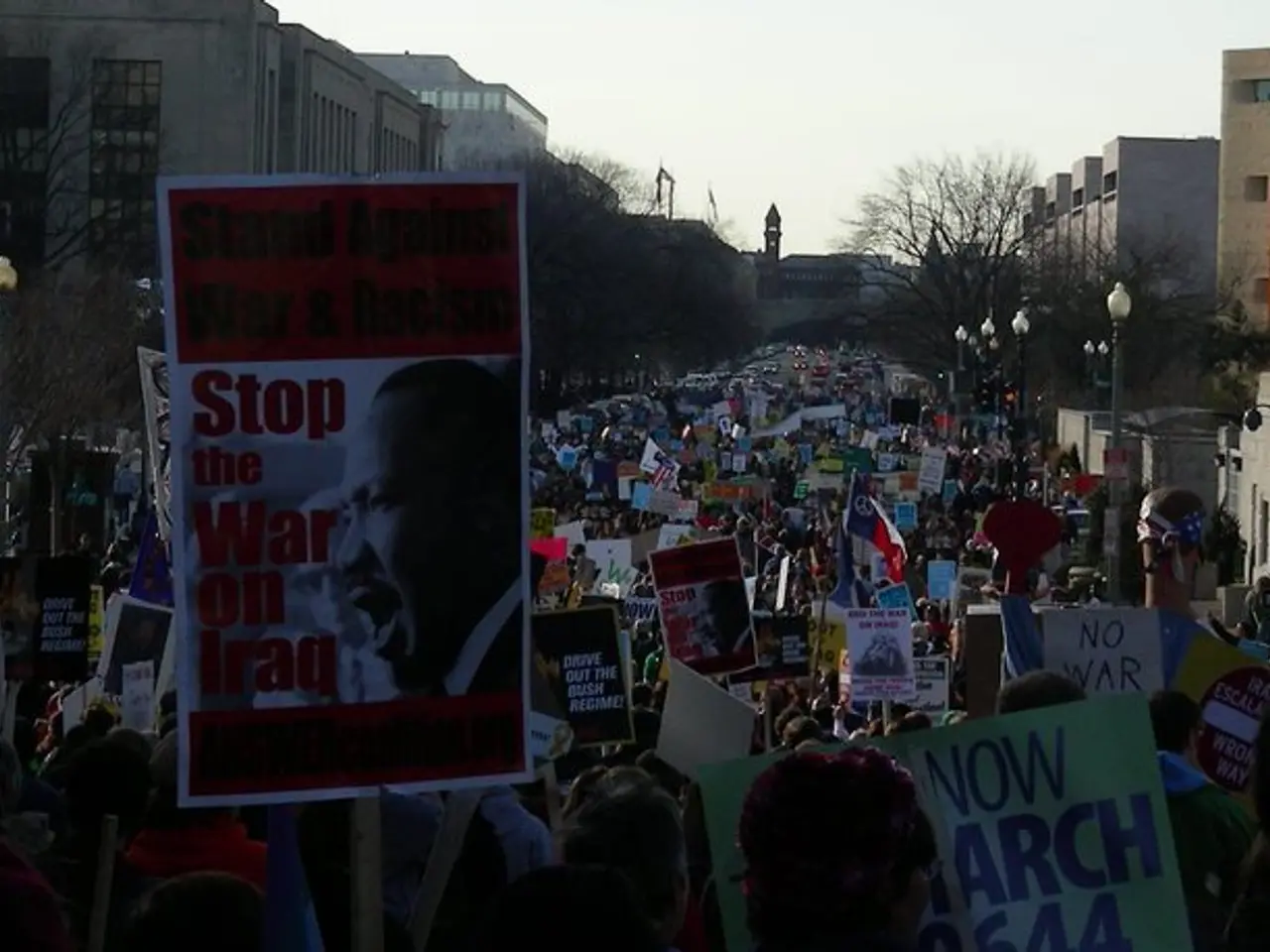Over 500 individuals detained during pro-Palestine demonstrations throughout the previous weekend, as reported by the UK police.
In a significant turn of events, the pro-Palestinian group Palestine Action has been classified as a terrorist organisation in the UK, effective from 5 July 2025. This proscription, under the Terrorism Act 2000, follows the UK government's judgment that some of the group's actions, including damage to arms factories and a military airfield, meet the threshold for terrorism-related offences [1][2].
The decision has led to a series of arrests across London and other parts of the UK. Over 500 people have been arrested, with 221 confirmed arrests by 7 August 2025, and 10 people formally charged [3]. The police are putting together case files and seeking approval from prosecutors and, in some cases, the attorney general for those arrested during the pro-Palestinian protest.
The proscription has been met with controversy and legal challenges. Critics, including Amnesty International, UN experts, and human rights authorities, have described the ban as an "unprecedented legal overreach" and a "disturbing misuse" of counter-terrorism laws that risks infringing on fundamental freedoms [2][4]. They argue that damage to property without intent to cause death or serious injury should not constitute terrorism.
The group's supporters, however, are challenging the ban in court, arguing that the government has violated human rights laws by declaring the group a terrorist organization. They believe that the group's actions, while criminal, do not promote or encourage violence against persons [1].
Home Secretary Yvette Cooper emphasized that Palestine Action is not a nonviolent organisation. She stated that the group was banned due to serious attacks involving violence, significant injuries, and extensive criminal damage [1]. The protesters staged the demonstration to express their belief that the government is illegally restricting freedom of expression by banning Palestine Action.
Notably, a significant number of those arrested during the pro-Palestinian protest were over the age of 60, according to the Met's figures. The police released updated information on the Palestine Action protest following the front pages of Sunday newspapers featuring photos of elderly protesters being carted off by officers.
The process of deciding whether to file charges against those arrested from the pro-Palestinian protest is expected to take weeks. The majority of those arrested were for displaying placards supporting the group Palestine Action [3]. Additionally, another 10 people were arrested for charges including assaulting and obstructing police officers.
As the legal proceedings unfold, the debate surrounding the appropriateness and impact of the designation of Palestine Action as a terrorist organisation continues. The future of the group and its supporters remains uncertain, as they navigate the complexities of the UK's counter-terrorism laws and the ongoing controversy surrounding their actions.
References:
[1] The Guardian. (2025, August 7). Palestine Action proscribed as a terrorist organisation by UK government. Retrieved from https://www.theguardian.com/uk-news/2025/aug/07/palestine-action-proscribed-as-a-terrorist-organisation-by-uk-government
[2] BBC News. (2025, August 7). Palestine Action banned as a terrorist organisation. Retrieved from https://www.bbc.co.uk/news/uk-62611891
[3] Sky News. (2025, August 8). Over 500 arrested in connection with Palestine Action protests. Retrieved from https://news.sky.com/story/over-500-arrested-in-connection-with-palestine-action-protests-12517301
[4] Amnesty International. (2025, August 10). UK's proscription of Palestine Action risks infringing on fundamental freedoms. Retrieved from https://www.amnesty.org/en/latest/news/2025/08/uks-proscription-of-palestine-action-risks-infringing-on-fundamental-freedoms/
The UK government's decision to classify Palestine Action as a terrorist organization has sparked a legal debate, with critics arguing that the government's proscription constitutes an "unprecedented legal overreach" and a "disturbing misuse" of counter-terrorism laws, potentially infringing on fundamental freedoms. On the other hand, supporters of Palestine Action are challenging the ban in court, maintaining that the group's actions, criminal as they may be, do not promote or encourage violence against persons. The complexities of the UK's counter-terrorism laws and the ongoing controversy surrounding Palestine Action's actions will shape the future of the group and its supporters. The government's action has led to multiple arrests across the UK, including a significant number of elderly protesters, and the process of deciding whether to file charges against those arrested is anticipated to take weeks.





